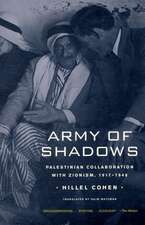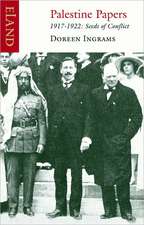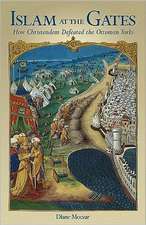Popular Muslim Reactions to the Franks in the Levant, 1097–1291
Autor Alex Malletten Limba Engleză Hardback – 28 dec 2013
| Toate formatele și edițiile | Preț | Express |
|---|---|---|
| Paperback (1) | 259.98 lei 6-8 săpt. | |
| Taylor & Francis – 30 iun 2020 | 259.98 lei 6-8 săpt. | |
| Hardback (1) | 819.90 lei 6-8 săpt. | |
| Taylor & Francis – 28 dec 2013 | 819.90 lei 6-8 săpt. |
Preț: 819.90 lei
Preț vechi: 1102.79 lei
-26% Nou
Puncte Express: 1230
Preț estimativ în valută:
156.94€ • 170.53$ • 131.91£
156.94€ • 170.53$ • 131.91£
Carte tipărită la comandă
Livrare economică 21 aprilie-05 mai
Preluare comenzi: 021 569.72.76
Specificații
ISBN-13: 9781409456124
ISBN-10: 1409456129
Pagini: 188
Dimensiuni: 156 x 234 x 17 mm
Greutate: 0.45 kg
Ediția:New.
Editura: Taylor & Francis
Colecția Routledge
Locul publicării:Oxford, United Kingdom
ISBN-10: 1409456129
Pagini: 188
Dimensiuni: 156 x 234 x 17 mm
Greutate: 0.45 kg
Ediția:New.
Editura: Taylor & Francis
Colecția Routledge
Locul publicării:Oxford, United Kingdom
Cuprins
Popular Muslim Reactions to the Franks in the Levant, 1097–1291
Notă biografică
Alex Mallett was Leverhulme Early Career Fellow in the History Department at Royal Holloway, University of London, UK in 2010-11.
Recenzii
'... tells us much about the lived experiences of people living with invasion and occupation... shed[s] many fascinating insights into the ways individuals and groups negotiated war and its aftermath. From personal decisions to aid or resist Frankish occupation, to collective attempts to repel or accommodate these invaders, the Muslims of the 12th and 13th-century Levant have left plenty of evidence of their involvement in the political events of their time. Mallett has written a book that shifts our view of these events quite profoundly.' Reviews in History
"[Mallett's] book remains a valuable supplement to existing literature on how Muslims responded to the two centuries of Frankish presence in the medieval Middle East."
- Christopher J. van der Krogt, Massey University, Palmerston North, New Zealand in Islam and Christian–Muslim Relations, 2016
"Popular Muslim Reactions to the Franks in the Levant is an excellent source book that documents the variety of Muslim responses to the Crusades. Alex Mallett showcases his extensive knowledge and expertise of the sources (both medieval European and Islamic) on the Crusader period, while tackling a very interesting topic and presenting a mass of interesting data."
-Suleiman A. Mourad, Smith College
"This is a satisfying book, which disentangles an important issue in the discussion of local Muslim reactions to the Frankish conquest of the Holy Land and the establishment of crusader states in the wake of the captures of Antioch (1098) and Jerusalem (1099)."
- Philippe Buc, Wien in MIÖG 125 (2017)
"[Mallett's] book remains a valuable supplement to existing literature on how Muslims responded to the two centuries of Frankish presence in the medieval Middle East."
- Christopher J. van der Krogt, Massey University, Palmerston North, New Zealand in Islam and Christian–Muslim Relations, 2016
"Popular Muslim Reactions to the Franks in the Levant is an excellent source book that documents the variety of Muslim responses to the Crusades. Alex Mallett showcases his extensive knowledge and expertise of the sources (both medieval European and Islamic) on the Crusader period, while tackling a very interesting topic and presenting a mass of interesting data."
-Suleiman A. Mourad, Smith College
"This is a satisfying book, which disentangles an important issue in the discussion of local Muslim reactions to the Frankish conquest of the Holy Land and the establishment of crusader states in the wake of the captures of Antioch (1098) and Jerusalem (1099)."
- Philippe Buc, Wien in MIÖG 125 (2017)
Descriere
The issue of Muslim reactions to the Franks has been an important part of studies of both the Crusades and Islamic history for a number of decades. This book examines the reactions of the Muslims of the Levant to the arrival and presence of the Franks in the crusading period, 1097-1291. It focusses on those outside the politico-military and religious elites arguing that it was they, as much as the more famous Muslim rulers, who were initiators of resistance to the Franks.

















